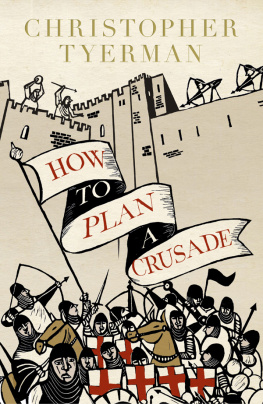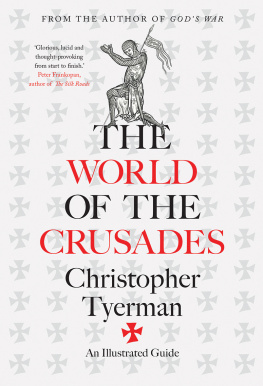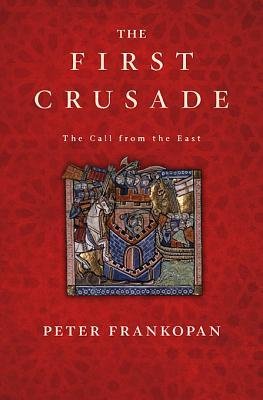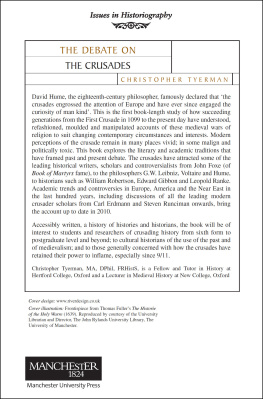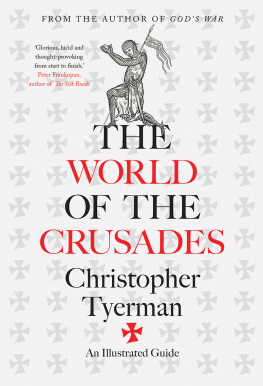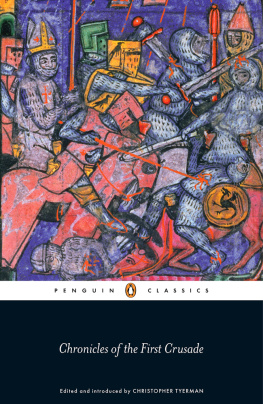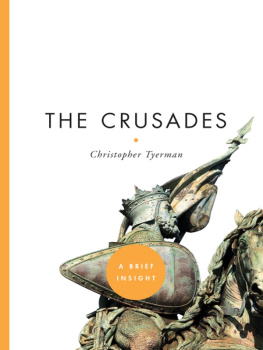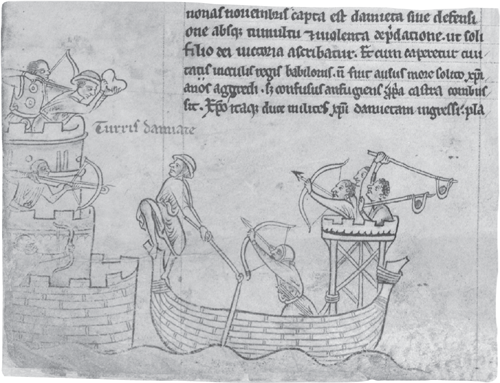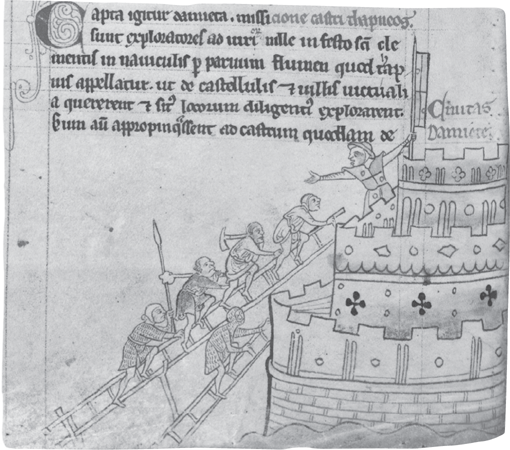Contents
Christopher Tyerman
HOW TO PLAN A CRUSADE
Reason and Religious War in the High Middle Ages
ALLEN LANE
UK | USA | Canada | Ireland | Australia
India | New Zealand | South Africa
Allen Lane is part of the Penguin Random House group of companies whose addresses can be found at global.penguinrandomhouse.com.
First published 2015
Copyright Christopher Tyerman, 2015
Cover illustration: Ignacia Ruiz
The moral right of the author has been asserted
ISBN: 978-0-141-97015-8
THE BEGINNING
Let the conversation begin...
Follow the Penguin Twitter.com@penguinukbooks
Keep up-to-date with all our stories YouTube.com/penguinbooks
Pin Penguin Books to your Pinterest
Like Penguin Books on Facebook.com/penguinbooks
Listen to Penguin at SoundCloud.com/penguin-books
Find out more about the author and
discover more stories like this at Penguin.co.uk
for Eleanor
Preface
A dank, Oxford, early March evening in 1979; a tyro historian stumbling through a lecture in the Examination Schools; the sparse audience nodding; the speaker wondering why he had ever begun. The door bursts open. Enter medieval knights, mailed soldiers, minstrels, fallen nuns (in fishnets and habits split to the thighs), lepers (the effect achieved with the application of candle wax) and other exotica. They chant Deus lo volt!, present the speaker with a splinter of wood (carried in a snuff box), beg him to lead them to Jerusalem, and then adjourn to the pub next door, quickly to be joined by lecturer and audience, united in relief at the destruction of his chain of thought. Later, splashed on the front page of the local newspaper, the reason for this trivial, youthful brouhaha was the lectures title: How to plan a successful crusade.
For the next three decades, similar provocation was avoided. Then, ambushed into presenting a paper to a seminar dedicated to planning in general, thoughts from times past revived. For the invitation that sparked the collection of ideas and material for this book, I have to acknowledge the ambushers, Mark Whittow and Nicholas Cole. Subsequent audiences in Oxford, Cambridge, Dublin, St Louis and New York have provided sympathetic sounding boards for my ideas. I must thank John Smedley for supplying the first opportunity to present my arguments for the payment of crusaders in print. For particular points, it is a pleasure as well as duty to record debts to Jessalynn Bird, Tim Guard and Kevin Lewis. More general obligations to other scholars working on related aspects of this book will be clear in the endnotes, but especial mention should be made of Martin Aurell, David Crouch, David dAvray, Piers Mitchell, Alan Murray and John Pryor. Without the libraries and librarians in Oxford, there would be no book. Colleagues in my two colleges, Toby Barnard, Roy Foster, Ruth Harris, David Hopkin, Robin Lane Fox and David Parrott, have provided possibly unwitting support and inspiration. My agent, Jonathan Lloyd, has, as ever, proved an effective champion. My editor, Simon Winder, has kept me honest. He and his team at Allen Lane/Penguin have once again presented a model of sympathetic and efficient publishing. This book is dedicated to someone who currently understands more keenly than most the importance of adequate provisioning.
CJT
Oxford
11 November 2014
Chronology
| c.400 | Augustine of Hippo outlines a Christian theory of just war |
| 638 | Jerusalem is captured by the Arabs under Caliph Umar |
| 800 | Charlemagne the Frank is crowned Roman Emperor of the West |
| 9th century | Holy wars proclaimed against Muslim invaders of Italy |
| 11th century | Church approval for wars against Muslim rulers in the western Mediterranean |
| 1053 | Pope Leo IX offers remission of sins to his troops fighting the Normans of southern Italy |
| 1050s70s | Seljuk Turks invade the Near East |
| 106191 | Norman conquest of Muslim Sicily with papal support and spiritual privileges |
| 1071 | Seljuk Turks defeat Byzantines at Manzikert; they overrun Asia Minor and establish a capital at Nicaea |
| 1074 | Pope Gregory VII proposes a campaign from the west to help Byzantium against the Turks and to liberate the Holy Sepulchre |
| 1095 | Byzantine appeal to Pope Urban II for military aid against the Turks; Urban IIs preaching tour of France (ends 1096); Council of Clermont proclaims Crusade |
| 109699 | First Crusade; Jerusalem captured (15 July 1099) |
| 1101 onwards | Smaller crusades to the Holy Land |
| 1104 | Acre captured |
| 11078 | Crusade of the First Crusade hero Bohemund of Taranto against Byzantium |
| c.1113 | Order of the Hospital of St John in Jerusalem recognized |
| 1114 onwards | Crusades in Spain |
| 1120 | Order of the Temple founded in Jerusalem to protect pilgrims |
| 1120s | Order of St John, the Hospitallers, beginning to become militarized |
| 1123 | First Lateran Council extends Jerusalem privileges to Spanish crusades and defines Church protection for crusaders |
| 1144 | Edessa captured by Zengi of Aleppo, leading to Eugenius IIIs bull Quantum praedecessores in 1145/6, which also outlines a range of crusader privileges |
| 11459 | Second Crusade of Louis VII of France and Conrad III of Germany; Dartmouth Commune and siege of Lisbon 1147 |
| 1149 onwards | Further crusades in Spain and, from the 1190s, the Baltic; small expeditions to the Holy Land |
| 11639 | The Franks of Jerusalem contest control of Egypt |
| 1169 | Saladin succeeds as ruler of Egypt |
| 1174 | Saladin begins to unify Syria with Egypt |
| 1187 | Battle of Hattin; Jerusalem falls to Saladin; Gregory VIIIs bull Audita Tremendi |
| 118892 | Third Crusade of Frederick I Barbarossa of Germany, Philip II of France and Richard I of England; 1190 Philip IIs treaty with Genoa; siege of Acre 118991; Richard I conquers Cyprus 1191 |
| 119091 | Foundation of Teutonic Order |

